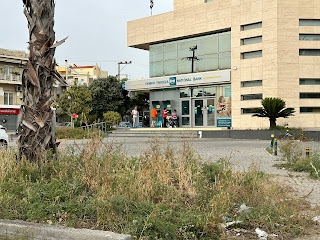On our first trip to Greece, I was worried how we would communicate since I spoke no Greek, and Randall, even less. We soon realized that in nearly every major area there was at least one person who spoke English, and no matter where we went, as long as we were polite and trying, we would be able to figure it out. I quickly learned the words for "please" and "thank you", which went a long way.
While visiting Stymphalos, we stopped at a small taverna, and as we were the only customers at the time, the proprietor struck up a conversation with us (in English) about the evolution of the Greek language and the introduction of modern Greek in the mid 1900s, eventually "resolved" in 1976 with the formal and final ratification of Dimotiki.
However, since we have been visiting over the last 10+ years, we've seen a new trend. The loss of the Greek alphabet and the slow progress of simply using English. Of course, we expect this when dealing with high tourist services--restaurants, hotels, some local mini-marts, anything connected to tourism, maybe even the petrol station, but what about for services which are exclusively marketed to the locals? Banks? Construction and gardening? Supermarkets?
Now, I will preface that for this trip, we have as yet only been to Athens, which I will exclude from this analysis due to its high international commerce and traffic, so this is from the quasi-microcosm of Crete, where we are still working to understand how this area functions. After all, in Minoan times, it was a center of international culture, so why shouldn't there be a well-ingrained history and penchant for learning and using all the languages with which it trades?
Still, I'll put these here as food for thought:
Randall hypothesized that the internet has caused at least part of this trend, since URL addresses must be in the Roman alphabet. I saw a painting contractor truck (couldn't get the picture, but there are other examples, and I'll add to this post) where the web address was the name of the company in Roman alphabet, which name was, still in the Roman alphabet, printed on the truck, and the description of services were entirely in Greek (Greek alphabet). The same is true of a "Super Market" written in English, and the produce/products detailed in Greek.

This leads to a second issue about how to pronounce words because there is no presumption that I should view a word as purely Greek, but I'll discuss that in another post.





No comments:
Post a Comment